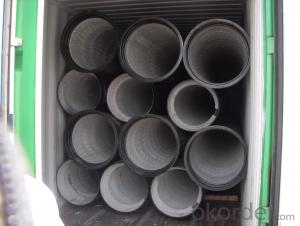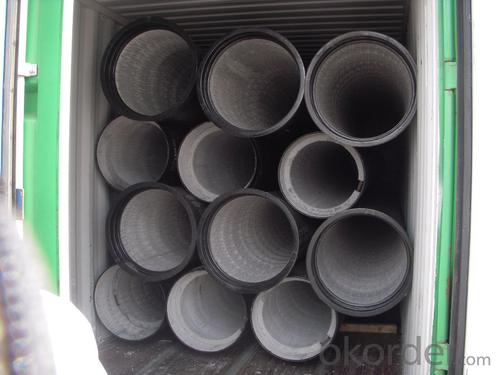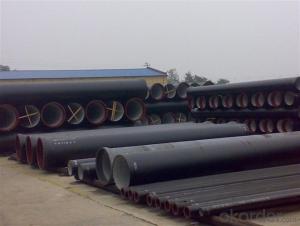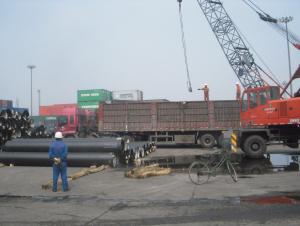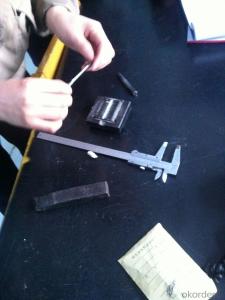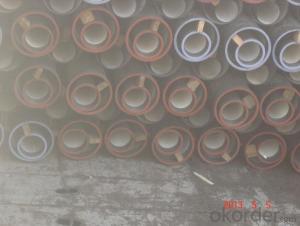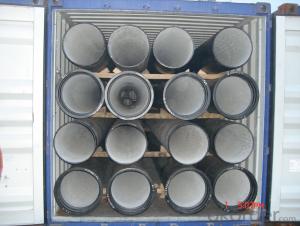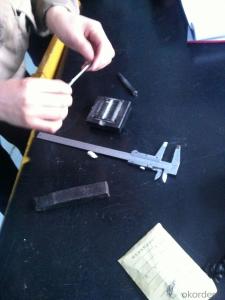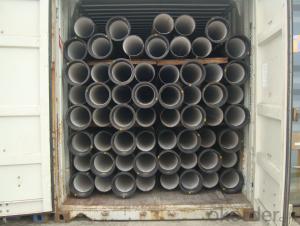DUCTILE IRON PIPES AND PIPE FITTINGS K8CLASS DN300
- Loading Port:
- Tianjin
- Payment Terms:
- TT OR LC
- Min Order Qty:
- 22 pc
- Supply Capability:
- 3000 pc/month
OKorder Service Pledge
OKorder Financial Service
You Might Also Like
Material : Ductile Cast Iron
Size Range : DN 80mm to DN 2000mm
Unit Effective Length : 6m or 5.7m
Manufacture Standard: ISO 2531:1998/ EN 545:2006/EN 598:2007
Annual capacity : 200,000 tons
Coating Exterior: Zinc 130g/m2 according to ISO 8179-1 and bitumen coating 70 microns.
Cement Interior: Portland Cement/ High Alumina Cement/ Sulphate Resisting Cement Lining according to ISO 4179
Special requirements on external coating and internal lining can be applied
We also provide accessories such as SBR/EPDM rubber gaskets, lubricant paste, pipe caps, PE sleeves, etc.
Additional Parts:
Each pipe is strictly inspected according to related standard to ensure permanently high performance.
Easy Installation at site and service free for life
Long Service Lifespan
Quotation will arrive you within 24hours once we get your inquiry.
We guarantee offering you a competitive price.
A copy of original inspection reports of pipes will be offered after shipment.
Photos of loading process will be sent to the customer after shipment effect.
We will follow-up the delivery progress after shipment effect and update to the customer on weekly basis.
- Q: What are the typical applications for ductile iron pipes?
- Ductile iron pipes are commonly used in various applications due to their unique properties and advantages. Some of the typical applications for ductile iron pipes include: 1. Water Supply Systems: Ductile iron pipes are extensively used in water supply systems, including municipal water distribution networks, as they provide excellent resistance against corrosion and have high durability. They can withstand high pressure and offer long service life, making them ideal for transporting potable water. 2. Wastewater and Sewage Systems: Ductile iron pipes are also widely utilized in wastewater and sewage systems. They can handle the transportation of sewage and other wastewater effectively due to their strength and resistance to chemical corrosion. These pipes are commonly used in underground sewer lines, sewer force mains, and wastewater treatment plants. 3. Industrial Applications: Ductile iron pipes find applications in various industrial sectors. They are commonly used for transporting different types of fluids, such as chemicals, slurries, and abrasive substances. Their strength, toughness, and resistance to external loads make them suitable for industrial pipelines, including those in power plants, refineries, and mining operations. 4. Irrigation Systems: Ductile iron pipes are frequently employed in irrigation systems for agriculture, landscaping, and golf courses. These pipes can withstand high water pressure and provide a reliable solution for transporting water over long distances. Their corrosion resistance ensures water quality is maintained, and their durability reduces the need for frequent maintenance. 5. Fire Protection Systems: Ductile iron pipes are widely used in fire protection systems, including sprinkler systems and fire hydrants. Their strength and ability to withstand high pressure make them suitable for delivering water rapidly in case of fire emergencies. These pipes are also resistant to heat, making them a reliable choice for fire protection applications. In summary, ductile iron pipes are versatile and widely used in various applications, including water supply systems, wastewater and sewage systems, industrial pipelines, irrigation systems, and fire protection systems. Their durability, corrosion resistance, and ability to withstand high pressure make them a preferred choice for these applications.
- Q: What are the advantages of using ductile iron pipe over concrete pipe?
- There are several advantages of using ductile iron pipe over concrete pipe. Firstly, ductile iron pipe has a higher strength-to-weight ratio compared to concrete pipe. This means that it can withstand higher pressure and loads while being lighter in weight. This makes it easier to handle and install, reducing labor costs and time. Secondly, ductile iron pipe has superior corrosion resistance compared to concrete pipe. It is less likely to rust or degrade over time, which increases its lifespan and decreases the need for frequent repairs or replacements. This makes it a more cost-effective option in the long run. Additionally, ductile iron pipe has better flexibility and resilience compared to concrete pipe. It can withstand ground movement, settling, and other environmental factors without cracking or breaking. This makes it more durable and less prone to damage, reducing maintenance and repair costs. Moreover, ductile iron pipe has a smoother interior surface compared to concrete pipe. This results in improved flow characteristics and reduced friction, allowing for more efficient transportation of fluids. It also minimizes the risk of clogs or blockages, ensuring uninterrupted flow. Furthermore, ductile iron pipe is highly versatile and can be used in a wide range of applications. It is suitable for both above-ground and underground installations, making it ideal for various infrastructure projects such as water supply systems, wastewater treatment plants, and industrial applications. Overall, the advantages of using ductile iron pipe over concrete pipe include its higher strength-to-weight ratio, superior corrosion resistance, better flexibility and resilience, smoother interior surface, and versatility. These benefits make it a reliable and cost-effective choice for various infrastructure projects.
- Q: What is the weight of ductile iron pipes compared to other materials?
- Ductile iron pipes are generally heavier compared to other materials commonly used in the construction industry. The weight of ductile iron pipes can vary depending on the specific size and dimensions, but they are typically heavier than materials such as PVC, HDPE, and steel pipes. This increased weight is primarily due to the dense nature of ductile iron, which provides durability, strength, and resistance to corrosion. However, the weight of ductile iron pipes also contributes to the challenges associated with transportation, installation, and handling, requiring appropriate equipment and techniques to ensure safe and efficient installation. Overall, while ductile iron pipes may be heavier than other materials, they offer numerous advantages in terms of longevity and performance in various applications.
- Q: What is the expected cyclic fatigue life of ductile iron pipes?
- The expected cyclic fatigue life of ductile iron pipes can vary depending on several factors such as material composition, pipe design, loading conditions, and environmental factors. However, ductile iron pipes are generally known for their excellent fatigue resistance. Ductile iron pipes are designed to withstand cyclic loading, which is commonly experienced in water distribution and sewer systems due to fluctuating pressures and vibrations. These pipes have a unique microstructure that provides high strength and ductility, allowing them to resist the formation and growth of cracks under cyclic loading. Several studies and industry standards have provided estimates for the expected cyclic fatigue life of ductile iron pipes. The American Water Works Association (AWWA) C151 standard, for example, recommends a design life of 100 years for ductile iron pipes used in water distribution systems, indicating their long-term durability and fatigue resistance. Furthermore, research studies have shown that ductile iron pipes can withstand over 1 million cycles of loading without any signs of fatigue failure. The fatigue strength of ductile iron pipes can be further enhanced by using protective coatings or linings to minimize the effects of corrosion and abrasion. However, it is important to note that the expected cyclic fatigue life of ductile iron pipes can be influenced by various factors such as the quality of manufacturing, installation practices, and maintenance procedures. Regular inspections, proper handling, and adherence to recommended installation guidelines can help ensure the longevity and performance of ductile iron pipes. In summary, while the expected cyclic fatigue life of ductile iron pipes can vary depending on several factors, these pipes are generally known for their excellent fatigue resistance and can provide a long-term and reliable solution for water distribution and sewer systems.
- Q: What is the expected bedding and backfill requirements for ductile iron pipes?
- The expected bedding and backfill requirements for ductile iron pipes typically involve using a suitable bedding material, such as crushed stone, to provide support and stability to the pipe. This is followed by proper backfilling around the pipe with a granular material, such as sand or gravel, to protect the pipe from external loads and prevent damage. The specific requirements may vary based on factors such as soil conditions, pipe diameter, and depth of installation. It is important to consult relevant standards and guidelines to ensure proper installation and long-term performance of the ductile iron pipes.
- Q: Can ductile iron pipes be used for underground storage tanks?
- No, ductile iron pipes are not suitable for underground storage tanks. Underground storage tanks usually require special materials that have corrosion resistance and can withstand the pressure and environmental conditions.
- Q: Can ductile iron pipes be used for underground drainage systems?
- Indeed, underground drainage systems can utilize ductile iron pipes. Ductile iron, being a robust and enduring substance, exhibits resistance to corrosion, rendering it appropriate for subterranean applications. Possessing remarkable tensile strength, it can endure substantial loads and pressures, thereby making it an excellent choice for drainage systems that encounter significant flow rates or necessitate substantial burial depths. Moreover, ductile iron pipes boast an extended lifespan, thereby decreasing the requirement for frequent maintenance or replacement. All in all, ductile iron pipes prove to be an unwavering and efficient option for underground drainage systems.
- Q: Can ductile iron pipes be used for high-pressure applications?
- Yes, ductile iron pipes can be used for high-pressure applications. Ductile iron has excellent strength and durability, making it suitable for handling high-pressure conditions. Additionally, ductile iron pipes have a higher pressure rating compared to other materials, making them a reliable choice for high-pressure applications.
- Q: Can ductile iron pipes be used for underground water treatment systems?
- Indeed, underground water treatment systems can utilize ductile iron pipes. Renowned for their robustness and longevity, these pipes are well-suited for a range of uses, including underground water treatment systems. They possess exceptional resistance to corrosion, rendering them perfect for transporting water through even the harshest subterranean surroundings. Furthermore, ductile iron pipes boast a remarkable load-bearing capacity, enabling them to withstand the immense pressure and weight exerted by the soil above. Additionally, their versatility allows for simple installation and maintenance, making them a sensible option for underground water treatment systems.
- Q: Is there a kind of pipe called lined ductile iron pipe? Seeking manufacturers?
- Yes, ductile pipe is divided into two kinds, one is the ductile cast iron pipe pipe socket (socket ductile pipe), which is mainly used for water supply system, namely the fire water, because of ductile iron pipe with pressure, 10kg, 12kg, 16kg. Pressure small price, a few cheaper, because pure in the production process of different, 1. sand mill 2. metal water cooling, like water, the basic is 16kg.
Send your message to us
DUCTILE IRON PIPES AND PIPE FITTINGS K8CLASS DN300
- Loading Port:
- Tianjin
- Payment Terms:
- TT OR LC
- Min Order Qty:
- 22 pc
- Supply Capability:
- 3000 pc/month
OKorder Service Pledge
OKorder Financial Service
Similar products
Hot products
Hot Searches
Related keywords
